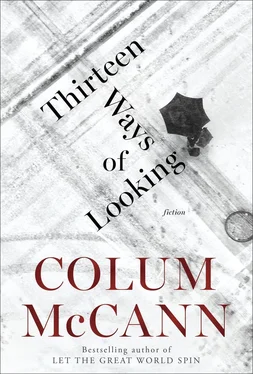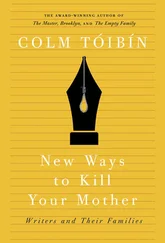There is no camera on the employee entrance, located ten yards down Madison Avenue, a simple metal door that leads past the bathrooms back into the kitchen. The only other obvious angle to the assault is from the traffic-cam on the light pole at Eighty-sixth and Madison: a wide view remotely accessed from traffic control. The quality is low, but the scope is wide. On any other day it might complement the restaurant footage — the tideline of taxis, the baleful swarm of dented trucks — but today it is obscured by snow blowing directly onto the lens, beginning with droplets that melt on the screen at first but then accumulate one by one, coalescing, a gathering curtain of white. It starts with flakes that melt and burn against the heat of the lens, stay a moment, rivulet along the screen. Then they arrive in more rapid flurries. They build, layer, vault upward into the camera, like a crowd of rioters obscuring the crime. At the time of the murder the only thing that can be seen through the granules of snow are the headlights of the approaching cars, small and spectral as they make their way up the avenue. No figures. No faces. No men in baseball caps. No images of an assailant running down the street.
Moments after the assault, the granules pick up the vague swirl of blue-and-red siren lights until eventually the street is closed off and the footage becomes a static portrait of headlights. There is no soundtrack, but the detectives can almost hear the car horns blaring in frustration, until the word murder begins to filter among the stalled cars and they fall silent.
The detectives look for cameras in the nearby stores and banks, but there are none with a suitable angle onto the front of Chialli’s. Yet they know that there is a solution embedded in the footage somewhere, or perhaps there is another camera to be found in the shops along Madison Avenue, or some other digital eye that is witness to the day. It’s a simple logic — a crime has been committed and therefore an answer must be available, somewhere, somehow. Nothing is elementally unsolvable. It’s an obvious physical law. If it happened, it can be unraveled. The difficulty comes in the sheer amount of work that must be done to sift through the footage. Even if they find a glimpse of a man in a B.C. hat — in the subway at Lexington Avenue, or walking quickly uptown away from the scene — they will have nothing to tie him directly to the punch.
Just as a poem turns its reader into accomplice, so, too, the detectives become accomplice to the murder. But unlike our poetry, we like our murders to be fully solved: if, of course, it is a murder, or poetry, at all.
I know noble accents
And lucid, inescapable rhythms;
But I know, too,
That the blackbird is involved
In what I know.
In he walks, a ball of bristle and fear. The phone shoved against his ear. In trouble again, no doubt. He shakes off his overcoat at the coat check. Drips of snowmelt on the floor in a wide constellation. The coat-check girl gives him the once-over. He removes his scarf to reveal a neck that could fold over itself several times. There is something of the ancient walrus about Elliot, imposing and lumbering at the same time. He exposes the big bald head with a whip-off of the hat and gestures across the restaurant with a single finger raised: Wait for me, but don’t expect me to hurry. He turns away from the coat-check girl and cups his hand over the phone. A serious call indeed. An anger in the bend of his body. A touch of the Irish about him. Red and veiny. What happened to Eileen’s fine genes? Maybe they all went in Katya’s direction. Strange how it happens. We never really become fathers to the whole experience. We become, instead, the sons of our sons. What happens to them, then, happens to us. So be it. That’s my boy in the corner of the restaurant, shouting now into his cell phone, and here I sit, with a glass of water, watching, and the truth of the matter is that I couldn’t love him any more or dislike him any less — the curse of the father. Could somebody please quietly shut him up and guide him over here to my favorite table so that he can shake my hand, maybe even kiss my freckled forehead, say hello, and slide silently into his seat and be the charmer that he once was? Maybe the snow will interrupt the cell-phone signal and we can sit in peace, and when was the last time we actually spoke to each other, not just pleasantries? When oh when did I say a word to him that truly meant something?
He reaches for his glass of water — and thank the heavens, he can see Elliot getting off the telephone. Hurry on now, son, you’re making quite a fuss, another fifteen minutes of my life gone to waste.
Snow really hammering down outside now. A swell of intent, slantwise along the street. Mach shnell, son. Join me.
Across the room, Elliot raises his finger once again, this one in apology, or what seems like apology at least, and begins to dial once more.
Oh, to hell with manners, which waitress is mine? Can’t remember, though she’s been at the table at least twice already. Is it the tall blonde or the small blonde or the medium blonde or the medium-medium blonde with the ponytail? The new manager, it seems, has a stake in a hair-dye company.
He turns in his chair and flicks a look across the room and, sure enough, here she comes the medium-medium blonde with a smile on her face. They grow more beautiful by the year. Either genetics or it’s the optics of old age.
— Yes, Mr. Mendelssohn?
— I’d like a glass of Sancerre, my dear.
— Of course, sir.
— And a Cabernet too. For the full-bodied fellow over there.
— Excuse me?
— My son.
— Oh, of course, sir.
She smiles mischievously and swishes her way towards the bar. Oh, for crying out loud, Elliot, get off the phone and stop embarrassing me, please. The temptation of the Apple, the glory of Eve, the confusion of Adam, and what is it with me and the Garden of Eden today? Let me remain with my BlackBerry, dangling on the vine, and did they have any blackberries in Eden, I wonder, to complement the apple trees, and where is it, by the way, the phone? He pats his pockets but it is not there. Must have left it in my coat. Turned up to high volume if I recall correctly. Or was it only on vibrate? That would be embarrassing if the thing starts to ring from afar. No more than six customers in the restaurant today, but that would make the noise even more acute. Please don’t let it ring, please. Turn up the music, Dandinho, please. Funny that. It’s Mendelssohn. Symphony no. 4. Filtering over the speakers. A nice clean, cool sound, though he can still hear his roiled-up son barking into the telephone. Once upon a time he was a charmer with a garrulous gift, but somewhere along the way it dissolved. Take it outside into the snow, Elliot. If your mother were here, she’d march straight across and give you what-for. And what is it we give our children anyway, except the ability to not become us? How awful the world would be if we were all carbon copies of one another. But Elliot most certainly is not his mother, and maybe I have to face it: he is more me, more’s the pity, for him, and for me, and perhaps for the rest of us too.
Here she comes, tray in hand. Sweating nicely: the glass, not the waitress. And a generous pour too: the drink and waitress both.
— You’re looking splendid today, young lady.
A speck of blue paint on the inside of her wrist. Probably an artist, they all have second jobs. Abstract, no doubt. A Brooklyn landscape, neat and precise but with a nice rounded swirl.
— Thank you, Mr. Mendelssohn. You’re quite dapper yourself.
Oh, how quickly the dark clouds disappear. From diaper to dapper. And she even knows my name. Genuine, it seems: she’s not just blowing smoke, like half the waitstaff seem to do every day, their mundanities, nice to see you, have a good day, are you still working on that, sir? I’m eating, young lady, not working. This medium-medium blonde has style and taste and charisma. Not just another throwaway. He must remember that come tip-time. He does indeed look — what’s the word? — oh, it’s fallen off the cliff face, gone, the old Yiddish phrase, there’s a few still in the vault, they bob up like Halloween apples, here and there, but what is it? Gone. Still and all, he looks dapper, yes. A Brooks Brothers shirt. A Gucci tie selected by Sally. A beautifully cut suit made for him by none other than Frankie Shattuck, the young boxer-tailor-soldier-sailor. The best damn suitmaker in New York. Good creases in the trousers. A beautifully finished collar. Silk lining. The clothes indeed make the man. When he was appointed to the Circuit Court, decades ago, he went straight down to the tailorshop to ask Frankie’s father to make him a proper judicial gown and that he did, the finest cloth, the most perfect stitches, the proper pockets, the right hang from his shoulders, the space inside to greet and gavel, farpitz —that’s the word, yes, farpitz . And he got one with an even finer cut of cloth when he got elected to the Supreme Court. Gone now, Frankie’s father. All of us fading like the morning dew. Our Yiddish too.
Читать дальше












